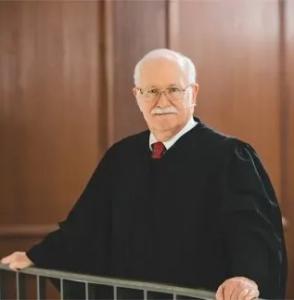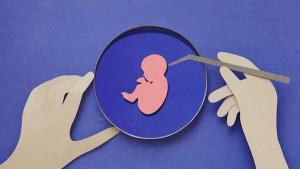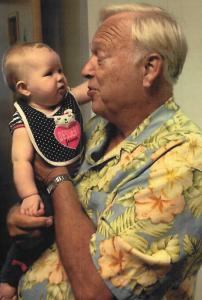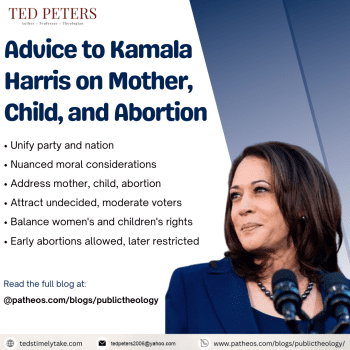Are frozen embryos really children?

Are frozen embryos really children? Should we grant every right belonging to a living child to a test tube stored in liquid nitrogen? Should we prosecute for murder a nurse who accidentally drops one on the floor? Might we get arrested for being negligent?
The Supreme Court of Alabama thinks that frozen embryos are children with legal protections against murder. This court ruling slammed Alabama family formation like a hurricane hitting the Gulf coast. Medical clinics offering reproductive technologies fear litigation that could put them out of business. So they closed.
What is of special interest to the public theologian here is that the supreme court appealed to biblical and theological reasoning to justify its ruling. Let’s look at this theological reasoning first in Alabama and then, in our next Patheos post, Roman Catholic bioethics. All of this will be pertinent to the public discussion of abortion access around which much of the 2024 presidential election controversy swirls.
Just what is at issue?
Might we get arrested for being negligent in an IVF clinic? Yes. This is the implication of the 8 to 1 ruling by Alabama’s supreme court on February 16, 2024. An existing law — wrongful death of a minor — covers not just fetuses in the womb, but also embryos held in a cryogenic storage facility. Unimplanted embryos created by in-vitro fertilization (IVF) are often frozen and eventually destroyed. If five eggs are fertilized and one is successfully implanted, the remaining four get discarded. Does this constitute abortion or even murder?
42% of adult Americans say they or someone they know have used fertility treatments. Baby-making with such assisted reproductive technology accounts for around 2% of US pregnancies. Should our nation withdraw from IVF family formation?
What happened in Alabama?

Here’s the justification for LePage v. The Center for Reproductive Medicine before the Supreme Court of Alabama.
“…unborn human life is sacred. We believe that each human being, from the moment of conception, is made in the image of God, created by Him to reflect His likeness. It is as if the People of Alabama took what was spoken of the prophet Jeremiah and applied it to every unborn person in this state: “Before I formed you in the womb I knew you, ‘Before you were born I sanctified you’.” Jeremiah 1:5 (NKJV 1982) (Alabama 2024, 48).
Here’s the implication that concerns us: by declaring frozen embryos ex vivo (extrauterine or outside the mother’s body) to be children with protective rights, frozen embryos may not be discarded or destroyed or even treated with negligence. “Upholding the sanctity of unborn life, including unborn life that exists outside the womb…including the right to life” is the chief concern of Chief Justice Tom Parker. Parker’s opinion relies heavily on theological rumination.
“But the principle itself — that human life is fundamentally distinct from other forms of life and cannot be taken intentionally without justification has deep roots that reach back to the creation of man ‘in the image of God’. Genesis 1:27 (King James) (Alabama 2024, 33).”
In short, because the human person is created in the image of God, an individual life cannot be taken without extraordinary justification. After quoting Augustine, John Calvin, and the Dutch Reformed tradition, Parker summarizes his argument against negligently handling frozen embryos.
“In summary, the theologically based view of the sanctity of life adopted by the People of Alabama encompasses the following: (1) God made every person in His image; (2) each person therefore has a value that far exceeds the ability of human beings to calculate; and (3) human 37 SC-2022-0515; SC- 2022-0579 life cannot be wrongfully destroyed without incurring the wrath of a holy God, who views the destruction of His image as an affront to Himself. Section 36.06 recognizes that this is true of unborn human life no less than it is of all other human life that even before birth, all human beings bear the image of God, and their lives cannot be destroyed without effacing his glory (Alabama 2024, 37-38).”
Any dissenters? Yes, one. Justice Greg Cook dissented. “A frozen embryo does not fit within the statutory definition of ‘person’ as that term is used in Alabama’s criminal-homicide statutes and thus cannot be a ‘minor child’ under the Wrongful Death Act” (Alabama 2024, 116).
Getting clear in Alabama

The Supreme Court of Alabama decision risks misinterpretation. The decision did not ban IVF. To the contrary, the decision scared the legal pants off IVF clinics by making them liable for any accidental abortions of cryopreserved embryos. This ruling shut down reproductive services out of fear of litigation. Writing in First Things, Ryan T. Anderson celebrates the Alabama achievement.
“The media didn’t just overreact to a judge’s mentioning God as the source of the sanctity of life. They falsely claimed IVF was about to be banned—and Republicans fell for the claim. In reality, the Alabama civil (not criminal) case was brought by the parents of IVF children, not opponents of IVF. The clinic keeping their embryonic children in cryopreservation had not provided adequate protection, so a patient managed to wander in and remove several embryos, causing their deaths. The parents sued to hold the clinic accountable for the wrongful death of their children. And the Alabama Supreme Court held that a statute protecting minors (including, as precedent held, embryos in the womb) contained no exception for embryos outside the womb. Far from attempting to ban IVF, the parents who brought this lawsuit were trying to protect frozen embryonic children, and rightly so.”
Let’s get it straight. The high court is not banning IVF baby-making. Rather, it is drawing out implications of proscribing abortion on the grounds that morally protected human dignity is established at conception. If you believe that we receive the image of God at conception, then we are legally protected even if we live as a frozen embryo on a nitrogen tank.
Facing public pressure to get IVF services resumed in the state, on February 29, 2024, both chambers of the Alabama Legislature advanced legislation that would extend lawsuit protections to clinics. But, this legislation does not address the philosophical issue of whether the frozen embryo enjoys the same protective rights that children do.
Pre-Conclusion: Further Discourse Clarification is Warranted
I wish to thank the justices of the Supreme Court of Alabama for their compassionate approach to the question of protecting the life and wellbeing of children yet to be born. I further wish to thank the justices for admitting relevant biblical and theological evidence into their reasoning.
Nevertheless, I must concur with the dissent. When we ask our scientists to tell us what happens in nature to the early embryo, we learn that the court’s majority opinion loses its empirical foundation. We cannot say biologically that the extrauterine embryo before implantation in the mother’s uterus on the 14th day constitutes an individual human person. I will provide detail in the next Patheos posts.
All of this warrants discourse clarification on the part of the public theologian. To that task we now turn. In what follows we will rely on background information regarding recent Roman Catholic bioethics.
SR 5101. Abortion 1. Are frozen embryos really children?
SR 5102. Abortion 2. Protecting Embryos in the Vatican
Abortion Access for Women’s Health? What about the Baby?
▓
 Ted Peters pursues Public Theology at the intersection of science, religion, ethics, and public policy. Peters is an emeritus professor at the Graduate Theological Union, where he co-edits the journal, Theology and Science, on behalf of the Center for Theology and the Natural Sciences, in Berkeley, California, USA. His book, God in Cosmic History, traces the rise of the Axial religions 2500 years ago. He tackled the implications of genetic innovation for the future of humanity in Playing God? Genetic Determinism and Human Freedom? (Routledge, 2nd ed., 2002) as well as For the Love of Children: Genetic Technology and the Future of the Family (Westminster/John Knox 1997). His essays are collected in Science, Theology, and Ethics (Ashgate 2003) The Voice of Public Theology (ATF 2023).
Ted Peters pursues Public Theology at the intersection of science, religion, ethics, and public policy. Peters is an emeritus professor at the Graduate Theological Union, where he co-edits the journal, Theology and Science, on behalf of the Center for Theology and the Natural Sciences, in Berkeley, California, USA. His book, God in Cosmic History, traces the rise of the Axial religions 2500 years ago. He tackled the implications of genetic innovation for the future of humanity in Playing God? Genetic Determinism and Human Freedom? (Routledge, 2nd ed., 2002) as well as For the Love of Children: Genetic Technology and the Future of the Family (Westminster/John Knox 1997). His essays are collected in Science, Theology, and Ethics (Ashgate 2003) The Voice of Public Theology (ATF 2023).
Recently Ted edited AI and IA: Utopia or Extinction? (ATF 2019). Along with Arvin Gouw and Brian Patrick Green, he co-edited the new book, Religious Transhumanism and Its Critics hot off the press (Roman and Littlefield/Lexington, 2022). His fictional spy thriller, Cyrus Twelve, follows the twists and turns of a transhumanist plot.
Visit Ted Peters’ website, TedsTimelyTake.com.
▓
References
Alabama. LePage v. Center for Reproductive Medicine. Ruling, file:///C:/Users/Ted/OneDrive/Documents/My%20Research/2024%20Alabama%20Supreme%20Ct%20IVF%20text.pdf: Supreme Court of Alabama, 2024.
Peters, Ted, Karen Lebacqz, and and Gaymon Bennett. Sacred Cells? Why Christians Should Support Stem Cell Research. New York: Roman and Littlefield, 2008.














